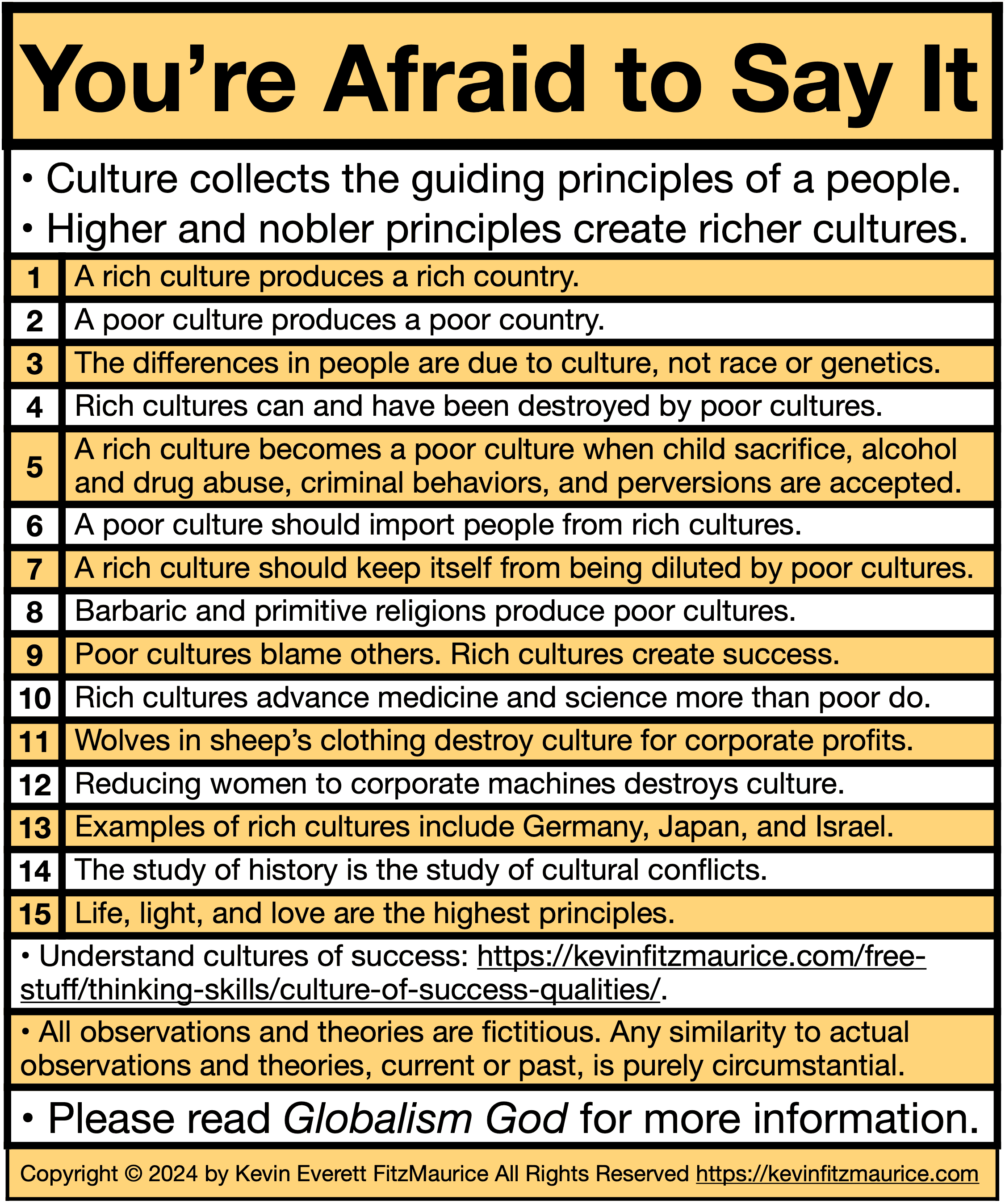8 Qualities of Cultures of Success
- We’re All Insane! Second Edition will teach you how to think better and saner.
“A country can be independent, have a good form of government, have natural resources, have good trade access and routes, and everything necessary for success; however, if the people do not have a culture of success, then that country will not be successful.” —Kevin Everett FitzMaurice
“It would not matter what kind of society and government a country had if people of virtue were running it.” —Kevin Everett FitzMaurice
“No government can lead its people to success if the people do not have a culture of success.” —Kevin Everett FitzMaurice
“Regarding nothing as too light/ To need his utmost skill,/ All Difficulties fade from sight,/ And he attains his will.” —Lao Tzu, Tao of Lao Tsze, page 63
“The quality of a person’s life is in direct proportion to their commitment to excellence, regardless of their chosen field of endeavor.” —Vince Lombardi
- Read and discover the world’s best breathing system.
- Read and discover the best system of government ever invented.
Qualities of Cultures of Success vs. Cultures of Failure
“Nothing will work unless you do.” —Maya Angelou
“There is only one human race; however, there are many cultural differences between humans.” —Kevin Everett FitzMaurice
This author is responsible for this list and presentation. However, the famous economist Thomas Sowell believes that culture is the most important condition and variable in success.
“One of the most important reasons for studying history is that virtually every stupid idea that is in vogue today has been tried before and proved disastrous before, time and again.” —Thomas Sowell
- What does a culture of success have that cultures of failure do not have?
- If cultures of failure exhibit many of these items, they lack sufficient strength, integrity, or dedication.
- If cultures of failure exhibit some of these items, then they lack sufficient elements to make a difference.
- Ultimately, culture determines success or failure, not race, ethnicity, religion, or history.
Categories of Traits & Qualities of Success Cultures
“Even so faith, if it hath not works, is dead, being alone.” —James 2:17
- The categories are organized alphabetically.
- The traits are not prioritized.
- Many qualities listed under one category also fit well into other categories.
- The categories provide some organization and direction, not rigid boundaries or rules.
- Successful cultures will have these eight qualities, but not perfectly.
1. Develop Character Traits by Practice
“Putting things off is the biggest waste of life: it snatches away each day as it comes and denies us the present by promising the future.” —Seneca
- They have self-discipline.
- They can commit to a goal.
- They focus on skill development.
- They focus on education and self-improvement.
- They have a strong work ethic.
- Their word is their bond.
- If they say they will do something, you can count on it being done.
2. Family Is the Basic Unit of Society & Is Protected
“The Universal Declaration of Human Rights is an international document adopted by the United Nations General Assembly that enshrines the rights and freedoms of all human beings.” —UN Statement on Human Rights
Article 16: The family is the natural and fundamental group unit of society and is entitled to protection by society and the State.
- The family is valued more than the State or any company or corporation: family first.
- The family is the focus of success.
- The family is the purpose of success.
- The family exists to raise successful children, grandchildren, and great-grandchildren.
- Children are encouraged to succeed for themselves and their families.
- Each generation is expected and prepared to surpass the last generation.
- Extended families (mainly relatives) help and encourage each other to succeed.
- Friendships connect families and provide more significant opportunities for success.
- Alimony, child support, and loss of parental rights by fathers are not allowed to increase to the point of making marriage a fool’s game for men and a way for women to freeload on society (including welfare).
- Single parenting is discouraged and frowned upon. However, exceptions are allowed.
- Nontraditional families are discouraged and frowned upon. However, exceptions are allowed.
- Women want to be able to take care of their children, so they seek a good provider (for food, clothing, and shelter) and a defender (for child safety).
- This desire for support means women look for signs of wealth and success, such as a family history of wealth, job potential, strength (for farming, hunting, and protecting), height (women want men who are at least taller than they are), a work ethic, and anything that might help, such as education, good looks, good manners, and social ability.
- This desire drives men to success so that they might be attractive to women.
- The need to appear successful or wealthy drives men’s fashion, enabling men to appear attractive to women.
- Unfortunately, some aspects, like cars and clothes, get exaggerated and made too important to appear “successful,” which is often just another name for appearing to be a good provider.
- Women want men to be monogamous so that all the men’s resources go to supporting their children.
- Men want children, so they seek a good wife and mother.
- This desire for children means men look for signs of fertility, youth, and health.
- Fertility signs are red lips (faked with lipstick), red cheeks (faked with rouge), a firm body (faked with wired bras, corsets, girdles, reinforced elastic clothing, cosmetic surgery, and firm legs faked with high-heel shoes), youthfulness (bright eyes are faked with eye makeup, wrinkles are removed with surgery, sagging skin is removed with surgery, keeping a little girl voice even as an adult, curly hair and ringlets that often fade with age can be faked at salons, smooth skin can be faked with cosmetics and surgeries, age can be lied about, photos can be doctored or switched, a hairless body can be faked by removing hair), thinness (assisted with surgeries such as liposuction), and other signs of youth such as blonde hair and light skin color, which can occur in youth and fade with aging.
- This need for a youthful or fertile appearance drives women’s fashion, enabling them to appear attractive to men.
- Unfortunately, some aspects, such as skin color, are exaggerated and made too important to appear “beautiful,” which is often just another name for being perceived as fertile.
- Men want women to be monogamous so that all the men’s resources go to supporting their own children.
- Modesty is a virtue because it keeps the private private.
- Virginity ensures a man will be supporting his own children.
3. Perfection Is a Constant Goal
“If it is worth doing, then it is worth doing right.” —Anonymous
“Perfection is not attainable, but if we chase perfection, we can catch excellence.” —Vince Lombardi
“Progress is not achieved by luck or accident, but by working on yourself daily.” —Epictetus
“Regarding nothing as too light/ To need his utmost skill,/ All Difficulties fade from sight,/ And he attains his will.” —Lao Tzu, Tao of Lao Tsze, page 63
Continuous Quality Improvement Explained: https://ideascale.com/blog/what-is-continuous-improvement/
- They are committed to quality, excellence, faultlessness, and perfection.
- They always want to do everything better, faster, and easier.
- They recognize the value of competition to improve results.
- They measure and track progress.
- They create and recreate until they have something worthy.
- They pay attention to details.
- They demand the best of themselves and others.
- They value challenges, struggles, and achievements.
- They value testing, examining, and proving their ideas.
- They value experimentation and exploration.
- They value increasing and sharing information.
- They value collecting and safeguarding information.
- They value precision, rigor, exactitude, carefulness, meticulousness, and attention to detail.
- They value organization, framework, and methodology.
- They value cleanliness, sanitation, neatness, and tidiness.
- They believe in doing every task well, even if it is only temporary (everything matters).
- They believe in doing more than necessary.
- They look for work. For example, when cleaning, they search for dirt; when caulking, they look for gaps; when repairing, they seek options to fix something; and they always strive to do more than what was assigned.
- They want to outperform, go the extra mile, impress, and beat expectations.
- They continually want to improve their skills.
- No matter how talented they are, they practice more than others.
- They believe in being the first to arrive at work and the last to leave.
- They are willing to do the tedious, boring, and seemingly unrewarding work to get things done right.
4. Persistence & Determination for Ambitions
“The greater the difficulty, the more glory in surmounting it. Skillful pilots gain their reputation from storms and tempests.” —Epictetus
- They persist in reaching their goals.
- They spend the time it takes to practice skills.
- They refuse to give up when near the finish line.
- They are self-motivated.
- They compete against themselves.
- They are self-driven.
- They don’t accept excuses but look for solutions.
- They believe they can achieve.
- They fail and start over.
- They consider failure a path to success.
- Each generation of a family is expected to surpass the achievements of the previous one.
- They are ambitious and want to only work with and be around other ambitious people.
- They seek to work for themselves and to be their own boss.
- They seek to collect and share knowledge on how things work (encyclopedias, textbooks).
5. Positive Attitudes Around Success
“And whatsoever ye do, do it heartily, as to the Lord, and not unto men;” —Colossians 2:23
- They believe in success.
- They help others to succeed.
- They encourage others to succeed.
- They don’t blame society for their lack of success.
- They seek mentors and provide mentorship.
- They prize innovation and believe in solutions to problems.
- They take responsibility for their failures.
- They don’t blame their parents, race, or lack of opportunity for their failures.
- They make their own opportunities.
- They make new paths to success.
- They will sacrifice for success.
- They do not beg.
- They refuse support but want to accomplish it on their own.
- They continue to fail until they succeed.
- They value success.
- They don’t hate the successful but honor them.
- They are not jealous of the successful but are inspired by them.
- The success of others inspires and motivates them, rather than discouraging them.
6. Problem-Solving & Coping Skills
“Follow effective action with quiet reflection. From the quiet reflection will come even more effective action.” —Peter Drucker
- They know how to cope with difficulties, obstacles, setbacks, hurdles, trials, and tribulations.
- They can find help, support, resources, advice, and counsel.
- They overcome procrastination.
- They learn to problem-solve and find effective solutions to challenges.
- They have an anti-victim mentality.
- They value strength of character, honesty, and integrity.
- They seek help and advice when needed.
- They are self-reliant, but not to the point of being overly independent.
7. Promotion by Merit, Not by Privilege
“Beauties in vain their pretty eyes may roll; Charms strike the sight, but Merit wins the soul.” —Alexander Pope
“The same principle leads us to neglect a man of merit that induces us to admire a fool.” —Jean De La
- People are hired and promoted because they excel in their roles.
- People are hired and promoted because they work harder than others.
- People are hired and promoted because they have demonstrated their capabilities on the job.
- People are not hired or promoted based on their class, ethnicity, or race.
- People are not hired or promoted based on gifts, favors, or personal relationships.
- People are not hired or promoted because they belong to the correct party or organization.
8. Various Work Ethics
“And whatsoever ye do, do it heartily, as to the Lord, and not unto men;” —Colossians 2:23
“For even when we were with you, this we commanded you, that if any would not work, neither should he eat.” —2 Thessalonians 3:10
“Regarding nothing as too light/ To need his utmost skill,/ All Difficulties fade from sight,/ And he attains his will.” —Lao Tzu, Tao of Lao Tsze, page 63
- They put in the necessary time to complete a job.
- They spend the time it takes to practice skills.
- They work even when not feeling well or at their best.
- They believe that work and life go hand in hand.
- They do what they must to show up for work.
- They do not make excuses for missing work but make better plans for the future.
- They do not make excuses for being late to work, but make better plans for the future.
- They do not relax until the house is clean. Cleanliness is a priority.
- They do the work they love or love the work they do.
- Their word is absolute, and they will move heaven and Earth to make their word come true.
- They clean corners and prevent grime from building up.
- They leave every place better than how they found it.
- They honor all work and do not consider any work beneath them.
9th Category Cultures of Success
A ninth category could be added.
- Education and reading.
However, universities and other institutions mock education and turn it entirely into programming propaganda.
10th Category Cultures of Success
A tenth category could be added. It would consist of expectations for some of that culture’s institutions.
Here is an example:
- Art: They have art that enables and inspires greatness.
- Writing: They have stories and philosophies that promote the highest virtues over the lowest.
- Music: They have music that promotes love and harmony.
- Entertainment: They have entertainment that promotes enjoyment and relaxation.
- Religion: They have a religion that emphasizes family, work, government, helping others, virtue, and a belief in God as the highest.
11th Category of Cultures of Success
Frank Zanu has suggested two important variables necessary for cultures of success to develop.
- Frank Zanu
- Mr. Zanu points out that cultures of success share a common language.
- He also points out that cultures of success have had to deal with environmental challenges stemming from living in areas with four different seasons and regular natural disasters.
Culture Is Shared Values: 08-14-2024
- Culture is the values (such as “go the extra mile”) regularly admired and encouraged in a society.
- Culture is the values (such as “strive for excellence in all things”) that get regularly promoted and rewarded in a society.
- Culture is the values (such as “do as little as necessary to get by”) that parents, family, friends, and acquaintances discuss, provide examples for, and openly agree upon.
- Culture is the values that produce a civilization’s strength and results, such as its contributions to virtue, philosophy, education, medicine, the arts, and science.
- Cultures decline when their values are ridiculed, abandoned, and replaced during education, training, social discourse, and the media (books, movies, the Internet, art, and news).
Quality of Culture Is the Great Predictor: 03-01-2025
- The quality of your country is equal to the quality of your culture.
- The prosperity of your country is equal to the quality of your culture.
- The worldwide respect for your country is equal to the quality of your culture.
- The progress of the people in your country is equal to the quality of your culture.
- The advancement of your country’s influence is equal to the quality of your culture.
Exactness for the Win: 04-13-2025
- Exactness will improve all you do by making it more effective, functional, and lasting.
- When you are exact in everything you do, you will be praised and valued more than most.
- The master seeks exactness in their thoughts, words, and deeds because exactness is the sibling of truth.
- To seek exactness has nothing to do with perfectionism or neuroticism and everything to do with results.
- A culture or country that makes exactness one of its primary purposes and instills it in its youth will do better than one that does not.
Laziness Produces Poor Cultures: 05-07-2025
- The most advanced cultures all have a work ethic.
- Your flesh nature prefers sloth; therefore, you must constantly choose against laziness.
- Our biggest mistake in life is calling the desires of our flesh nature the desires of our self.
- Teach yourself to prefer the soft inner voice that provides choices and directions based on morality and spirituality.
- When you identify with the feelings and intentions of your flesh nature, you believe serving laziness and other forms of immorality is what you want.
- Read to understand how to think on higher levels.
- Read and discover the best system of government ever invented.
Cultures of Failure Major Rules
- Do the opposite of what the cultures of success do.
- Have the opposite attitudes about success from cultures of success.
- Have the opposite attitudes about work from cultures of success.
- Have the opposite attitudes about perfection from cultures of success.
- Have the opposite attitudes about persistence from cultures of success.
- Have the opposite attitudes about problem-solving from cultures of success.
- Have the opposite attitudes about coping with cultures of success.
- Have the opposite attitudes about education from cultures of success.
- Have the opposite attitudes about skill development from cultures of success.
- Have the opposite attitudes about sacrifice from cultures of success.
- Ignore merit, and hire and promote based on victimhood, social justice, party, and privilege.
- Blame the system, disadvantages, racism, inequality, or something but yourself.
- Never take personal responsibility for your life.
- Never expect or teach others to take responsibility for their life.
- Accept old ways of doing things instead of constantly seeking to do everything better, faster, and easier.
- Make relaxing and being entertained your ambition, not success in a field or career.
Cultures of Failure Minor Rules
- Avoid work when you can.
- Do the minimum.
- Do enough to get by.
- Do as little as possible.
- Waste time whenever possible.
- Take frequent breaks.
- Overeating and drinking make you less fit for work.
- Assign more personnel to the job than necessary.
- Consider the act of striving to be self-abusive and punishment.
- Only clean what is visible or apparent.
- Always leave a mess wherever you work.
- Always leave a place worse than when you found it.
- Forget cleaning corners, cracks, and hidden areas.
- Forget deep cleaning and let grime accumulate and build up.
- Never consider picking up trash that you do not have to pick up.
- Consider yourself too good for manual labor, but get stuck with it anyway.
- Consider yourself too good to have to clean your own house and property.
- Consider having to do what it takes for excellence to be beneath you because of the struggle it involves.
- Consider that having your own company is too much work because you still have to work past “quitting time.”
- Read to understand how to think on higher levels.
- Read and discover the best system of government ever invented.
Related Pages of Free Information
- CBT, CT, & REBT Cognitive Psychotherapies: List Pages
- Continuous Quality Improvement Explained
- Coping Skills: Free Help
- Counseling Issues: Free Help
- Ego & Self-Esteem Fast-Facts
- Emotional Responsibility: List Pages
- Exercises & Techniques: List Pages
- Feelings & Coping: Fast-Facts
- How to Destroy the Western World: External
- Meditation: List Pages
- Quotations: Work
- REBT (Rational Emotive Behavior Therapy): List Pages
- Self-Esteem Issues: List Pages
- Thinking Skills: Free Help
- Unconditional Self-Esteem (USE): Defined
- Read and discover the best diagrams and maps of how people play games with their minds and hearts.
- Read and discover the best system of government ever invented.
6 Groups of Topics Menu
- 1. Pages by Topic
- 2. Fast-Facts by Topic
- 3. Quotations by Topic
- 4. Poems by Topic
- 5. Scripture by Topic
- 6. Websites by Topic
- Read for the best breathing exercises for your feelings and stress.
- Read and discover the best system of government ever invented.
9 Skills & Topics Menu
- 1. Anger Skills & Topics
- 2. Blame Skills & Topics
- 3. Communication Skills & Topics
- 4. Coping Skills & Topics
- 5. Counseling Skills & Topics
- 6. Praying Skills & Topics
- 7. Recovery Skills & Topics
- 8. Responsibility Skills & Topics
- 9. Thinking Skills & Topics
- Read for the best breathing exercises for your feelings and stress.
- Read and discover the best system of government ever invented.








